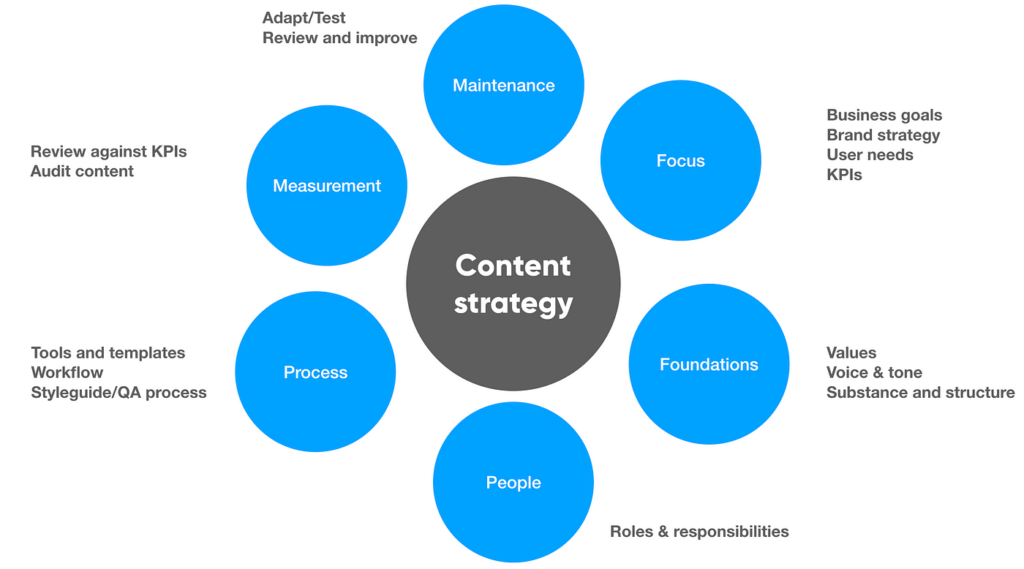Content strategy is the art and science of planning, creating, distributing, and managing content to achieve specific business goals. Whether you’re a solo entrepreneur or a global brand, a content strategy acts like a GPS guiding your messaging, targeting the right audience, and ensuring every piece of content you produce serves a purpose.

In today’s digital age, simply producing content isn’t enough. With millions of blog posts, videos, and podcasts uploaded daily, you need a strategy to stand out. That’s where content strategy comes into play it helps brands not only reach but connect with their audience meaningfully.
Why Content Strategy Matters
Builds Brand Trust
People buy from brands they trust. A consistent content strategy helps you build authority in your niche, making audiences see you as reliable and knowledgeable.
Improves SEO
Great content backed by strategy ranks better on search engines. With well-placed keywords, structured formatting, and optimized images, your content gets discovered by the right people.
Supports Sales
Strategically crafted content guides users through the buyer’s journey from awareness to decision-making nurturing leads and increasing conversions.
Core Elements
Target Audience Research
Understanding your audience’s needs, preferences, and pain points is the foundation of effective content. Use surveys, customer interviews, and analytics to build personas.
Content Goals
Are you aiming to boost brand awareness, drive traffic, or generate leads? Clear goals help guide content creation and measure success.
Content Calendar
A publishing schedule ensures consistency and organization. Use tools like Trello, Asana, or Notion to plan weekly or monthly content.
Content Types
Select formats that suit your audience be it blog articles, videos, or podcasts. A well-rounded mix increases engagement.
Also Read: The Difference Between Short-Tail and Long-Tail Keywords
Steps to Develop a Content Strategy
- Define Your Goals: What do you want to achieve? Website traffic? Email sign-ups?
- Conduct a Content Audit: Analyze what you already have and what’s performing well.
- Create a Plan: Decide on themes, platforms, and publishing frequency.
Types of Content in a Strategy
- Blog Posts: Ideal for long-form insights and SEO.
- Videos: Highly engaging and shareable.
- Infographics: Perfect for data visualization.
- Podcasts: Great for on-the-go learning and brand voice.
Content Strategy vs Content Marketing
- Content Strategy is the planning stage deciding what, why, and how.
- Content Marketing is the execution actually creating and sharing the content.
Think of strategy as the blueprint and marketing as the construction crew.
Tools to Streamline
- SEO Tools: Like SEMrush and Ahrefs for keyword research.
- CMS Platforms: WordPress, Webflow, and others for publishing.
- Analytics Tools: Google Analytics or HubSpot to track performance
Measuring Success
Track KPIs such as:
- Organic traffic
- Bounce rate
- Conversion rates
- Time on page
These metrics show whether your content resonates or needs tweaking.
Content Distribution Channels
- Social Media: Engage followers and amplify reach.
- Email Marketing: Nurture leads and build loyalty.
- Paid Ads: Boost content visibility quickly.
SEO’s Role in Content Strategy
Search engine optimization ensures your content is discoverable. Prioritize:
- Keyword research
- Optimized titles and meta descriptions
- Internal linking
Content Repurposing Tactics
Why reinvent the wheel? Turn:
- Blog posts into infographics
- Webinars into articles
- Podcasts into social media clips
Maximize your content’s shelf life and reach.
B2B vs B2C Content Strategy
- B2B: Focuses on logical, data-driven content like whitepapers and case studies.
- B2C: Leans toward emotional appeal, storytelling, and social proof.
Common Content Strategy Mistakes
- Publishing without a plan
- Ignoring SEO
- Not analyzing results
- Failing to update old content
Avoid these traps to ensure long-term success.
Real-Life Examples of Content Strategy
- HubSpot: Masters at inbound marketing with valuable blog content.
- Nike: Uses storytelling and visuals to engage customers emotionally.
- Spotify Wrapped: Data-driven personalization meets viral content.
The Future of Content Strategy
- AI Integration: Automate research and content briefs.
- Voice Search: Optimize for spoken queries.
- Personalization: Tailor experiences for individual users.
FAQs about Content Strategy
1. What makes a good strategy?
A mix of audience research, clear goals, diverse content types, and performance tracking.
2. How long does it take to see results?
Typically 3-6 months, depending on consistency and SEO.
3. Do small businesses need strategy?
Absolutely! It helps them compete effectively and build a loyal audience.
4. How often should I update my strategy?
Every 6-12 months or when your business goals change.
5. Can I do strategy without a team?
Yes, with the right tools and planning, solo entrepreneurs can do it too.
6. What’s the difference between content strategy and social media strategy?
Content strategy covers all content forms, while social strategy focuses on social platforms specifically.
Conclusion
Understanding what is content strategy is crucial for any brand wanting to succeed in the digital age. It’s more than just creating content it’s about planning, purpose, and performance. By crafting a solid strategy, you don’t just inform your audience you inspire them to take action.